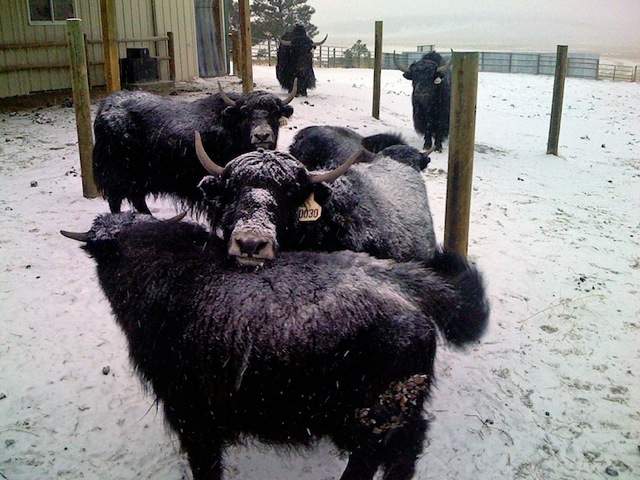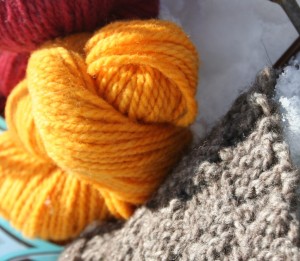New Jersey To Colorado: Bijou Basin Ranch

How did Carl and Eileen Koop, a computer software design engineer and a chemist respectively, go from the corporate world in New Jersey to a 70-acre yak farm and their own designer yarn company in Colorado?
It didn't happen overnight.
Both had traveled frequently for their jobs, across the country and around the globe. In 1982, they were offered the opportunity to relocate to Colorado. They said yes, made the move, and kept on working.
“Then one day I decided I couldn't take computer software work anymore,” recalls Carl Koop.
He went back to school, got certified as a veterinary technician, and started working at a mixed practice veterinary medicine facility.
Carl worked mornings with large animals such as horses, cattle, sheep, goats. Afternoons, he assisted vets with the smaller companion animals. Evenings, he and Eileen mulled over what to do with the 70 acres they now owned, having moved farther out from town by then.
The answer strolled up to Carl one day while he and a veterinarian were out vaccinating client's horses.
Two shaggy beasts ambled out from the barn. Friendly and curious, one kept nibbling at the back of Carl's jeans. He couldn't keep his eyes off them.
“I asked what am I looking at? And they told me – yaks.”

Intrigued, Carl discussed the animals with Eileen, who called that night from China, where she was on a business trip. They did research, some leg work, found a nearby resource for stock.
Within a month, the Koops had a starter herd of three cows and a bull.
Today the couple run a 70-acre spread called Bijou Basin Ranch, where they raise yaks and are growing their own brand of yarn called Bijou Spun. During the year, they take their company on the road to national venues such as Vogue Knitting Live in New York City (Jan. 22 and Jan. 23), Knitting Universe Stitches events, the recent National Needle Arts Association (TNNA) trade show in California, plus sheep and wool festivals in New York and Maryland.
“We learned that few people in the U.S. did anything with yak fiber and we decided that would be our niche. Yaks are not sheared. Most people call the yak fiber ‘hair' – but according to the dictionary definition, it is a true ‘wool' with crimp and scaled hair.”
 The luxurious yarn is available in a new palette of vibrant colors in addition to natural hues of cream and browns. “Gobi” is the newest addition, a limited edition yak and camel blend. Designers created 11 new patterns specifically to showcase Bijou Spun's properties and beauty.
The luxurious yarn is available in a new palette of vibrant colors in addition to natural hues of cream and browns. “Gobi” is the newest addition, a limited edition yak and camel blend. Designers created 11 new patterns specifically to showcase Bijou Spun's properties and beauty.
The Koops are in talks with shops in Italy and Europe about carrying their yarn lines.
“At the Sock Summit this summer, we're doing a contest with significant prizes to generate more interest in our fiber,” he notes.
The Koops now manage 21 animals and also import fiber from Tibet and Nepal for their yarns since domestic supplies are so limited. (There are 14,000,000 yak in Tibet versus some 6,000 yaks in the U.S.)
“Yaks are easy keepers,” he said. “They respect fences. They eat a lot less than cattle; out here in a dry land area, that's important. Yaks are bos grunniens and share a genus with cattle, bison, and musk ox. Vets typically treat them as they would cattle.”
Editor's Note: Yarn reviews and more about Bijou Spun products and patterns will be featured on Moo Dog Knits Magazine. Check out “Bijou Basin Ranch Fan Club” on Ravelry, the popular online fiber-centered (knit, spin, dye, etc.) community, where Carl is known as “Yakman.”
—————————————————————


